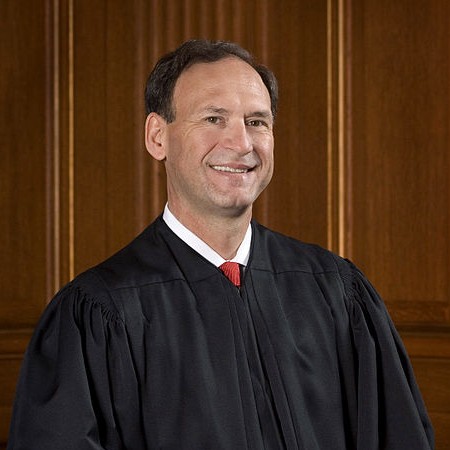Alito orders segregation of some Pennsylvania ballots; is it a 'nothingburger'?

U.S. Supreme Court Justice Samuel A. Alito Jr. Photo by Steve Petteway from the Supreme Court of the United States via Wikimedia Commons.
U.S. Supreme Court Justice Samuel A. Alito Jr. on Friday evening ordered the segregation of ballots received after Election Day in Pennsylvania pending action by the full high court.
Alito issued the order as the justice who considers emergency requests from the area, report SCOTUSblog and the Washington Post.
While he ordered segregation of the ballots, he did not grant Pennsylvania Republicans’ request to stop counting them.
Pennsylvania voters pushed former Vice President Joe Biden to a victory in the 2020 presidential race. Election returns from the Pennsylvania secretary of state’s website put Biden ahead of President Donald Trump by more than 42,000 votes as of Monday morning.
A post at the Take Care Blog characterizes Alito’s order as a “nothingburger” since the disputed votes may not be enough to make a difference.
The Supreme Court has so far declined to intervene in the Pennsylvania election battle, splitting 4-4 Oct. 19 on a GOP request to block the counting of ballots received after Election Day. The Pennsylvania Supreme Court had allowed three extra days after the election to count ballots postmarked by Election Day in a decision that cited the state constitution. Opponents say only the legislature can set the rules.
Before Alito acted, the Pennsylvania secretary of state had issued guidance that the state’s 25 canvassing boards should segregate the ballots arriving after Election Day. In their application to the Supreme Court, Pennsylvania Republicans said it’s unclear whether all the boards are following the guidance.
A cert petition is still pending before the Supreme Court in the case.
Writing at SCOTUSblog, Supreme Court litigator Tom Goldstein said the full Supreme Court should be “extremely cautious” in granting the application to segregate ballots.
Goldstein said an injunction may be unnecessary, in part because the ballots at issue might not be enough to make a difference in the election results in Pennsylvania. He also said the Supreme Court could leave Alito’s stay in place to allow the GOP to seek relief in Pennsylvania state courts.
“When the court acts, particularly on an emergency basis without detailed opinions, the subtleties are lost on the general public,” Goldstein wrote. “An order granting an injunction with respect to certain ballots inevitably is read as a statement that the court sees some serious flaw in the election process. And an order issued by a court that is closely divided on ideological lines is inevitably read as the justices simply enforcing their own political preferences.
“So if the court grants an injunction, the president and his supporters will use that order as part of an effort to delegitimize the election. Democrats will use it to delegitimize the court itself.”
A post at the Take Care Blog sees a positive for Biden in Alito’s order.
Separating the later-arriving ballots will make it possible to know how many ballots are in dispute and whether they are enough to make a difference, wrote the post author, Jason Harrow, the executive director and chief counsel of Equal Citizens, a nonprofit started by Harvard law professor Lawrence Lessig. Harrow doubts the separated votes would be enough to make a difference if Republicans were to succeed in getting them disqualified.
Harrow divides Trump’s election disputes into three categories.
The first is a recount, which is automatic in Georgia and requested in Wisconsin. Harrow said Trump lost Wisconsin by nearly 20,000 votes, yet the average flip in a recount is 282 votes. The only statewide presidential recount that ever flipped was in Hawaii in 1960, when about 300 votes flipped from Richard Nixon to John F. Kennedy, giving Kennedy a narrow victory in the state.
The second category, “pure shenanigans,” is for lawsuits that wouldn’t make a difference even if successful. Harrow puts Pennsylvania litigation in this category.
The third category, “Hail Mary,” is the “wild idea” of having state legislatures appoint Trump’s favored electors even though he lost in the vote count.
Harrow argues that doing that would violates voters’ fundamental right to cast a vote and have it actually count. He also said it would violate federal law requiring presidential electors to be chosen on Election Day, and it would violate Pennsylvania law setting the popular vote as the way to choose electors.
“That’s not to mention it would be seen as a coup and lead to mass protests, riots or worse,” he wrote.
Trump and Republicans have made little headway in election litigation, according to the Washington Post and Bloomberg Law.
Suits sought to get election observers closer to the ballot count, sought to stop the counting of absentee ballots, took issue with signature verification, objected to allowing voters to fix flawed ballots, alleged improprieties in vote counting, and alleged that out-of-state voters were allowed to submit ballots. Many judges cited a lack of evidence in rulings against the GOP.
Trump lawyer Rudy Giuliani has said the Trump campaign would file new lawsuits Monday alleging wrongdoing, according to the Washington Post.
“Many cases are going to be filed—some big, some small. This is going to be eventually a big case,” Giuliani said.
See also:
ABAJournal.com: “Dec. 8 ‘safe harbor’ deadline is a critical date in nightmare election scenarios”



